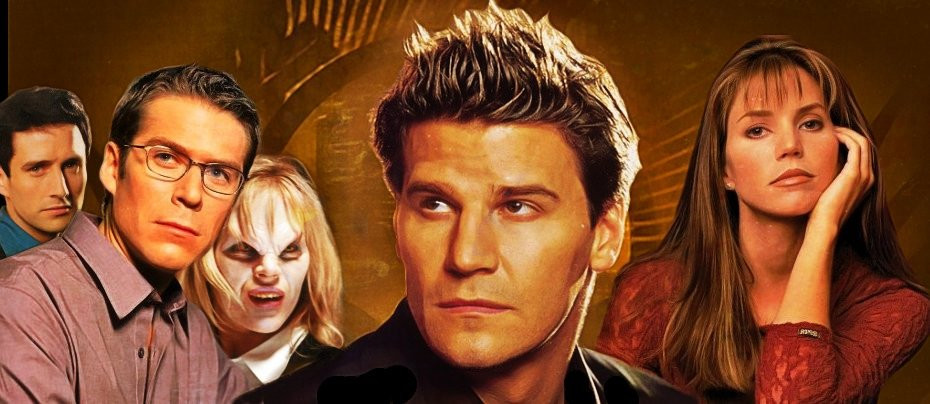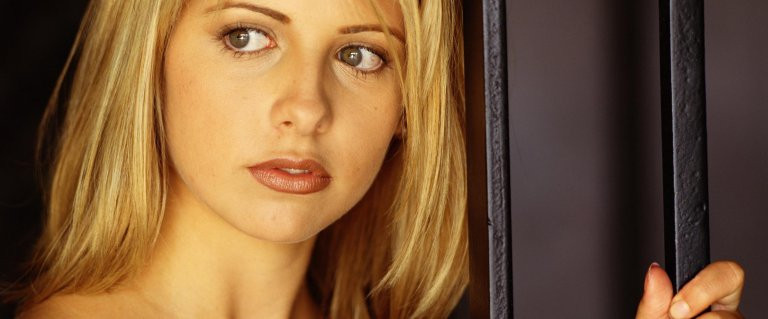
Buffy the Vampire Slayer - Season 3
Buffy the Vampire Slayer – Season Three (1998-99)
The fight between the two Slayers is powered by a season's worth of angst, jealousy, anger, betrayal, and broken friendship
Buffy's third season is one of its best, if not indeed the best, in its seven-year run. There's not a single duff or filler episode in the whole season. These episodes built perfectly on the climactic and catastrophic events of the previous season, while also setting the stage for the franchise's future. New characters joined the recurring cast, and the boundary between good and evil became ever more blurred. With an excellent balance of standalone and serialised episodes, the third season featured arguably the greatest villain of all the series' notorious Big Bads. Jane Espenson (Battlestar Galactica, Once Upon a Time, Torchwood: Miracle Day) and Doug Petrie (Fantastic Four, CSI: Crime Scene Investigation, Daredevil) joined the writing crew, giving the series perhaps its best pool of creative talent.
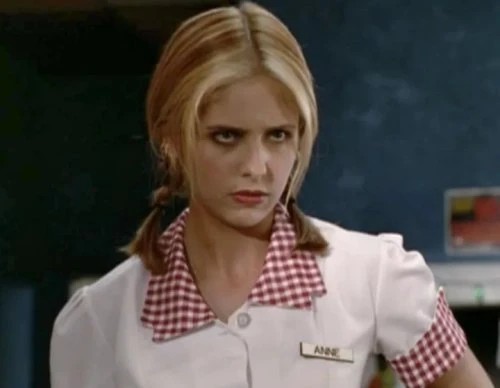
Season two ended with Buffy running Angel through with a sword and banishing him to hell in order to save the world from his evil other self, before jumping on a bus and running away to L.A. reeling from the trauma of these events. While her mother and friends try to cope in her absence, Buffy is living in a grubby apartment paid for from her meagre living as a waitress. The opening episode, “Anne,” sees Buffy going under her middle name as she tries to live a new life under a new identity. The supernatural is never far away though, even beyond the influence of the Hellmouth. Buffy runs into Chanterelle (Julia Lee) who had previously appeared as a vampire acolyte in 2.7, “Lie to Me.” Now going by the name Lily, she's living rough with her boyfriend Ricky (Chad Todhunter). When Ricky goes missing, Lily comes to Buffy, who reluctantly agrees to help look for him.
Before long it becomes clear that an overly friendly man calling himself Ken has been targeting lost and homeless teens and recruiting them to some kind of religious commune. This would be bad enough, really, but it turns out Ken (Carlos Jacott – She Spies, Firefly) is actually a skinless demon, who has been abducting his young recruits to his own hellish dimension, working them almost to death and then dumping them back on the streets. Time runs at a much faster rate in Ken's reality, and after a day on Earth decades have gone by for the abductees, returned to their world elderly and insane from their treatment.
A sobering look at the number of young people who run away to big cities only to come under threat from those who would exploit them, “Anne” is a gripping episode in its own right, but also quietly sets up a great deal for the future. The revelation that time can run at different rates in different dimensions in the Buffyverse will have major consequences in future storylines, and the more worldly setting of grimy downtown L.A. plays like a trial run for the upcoming spin-off Angel. Lily even continues on as an occasional character on that series, now taking on the mantle of Anne from Buffy. More immediately, fighting Ken and his fellow demons and ending their plans reminds Buffy of who she is, leading her to return to Sunnydale and face the fallout from the previous season.
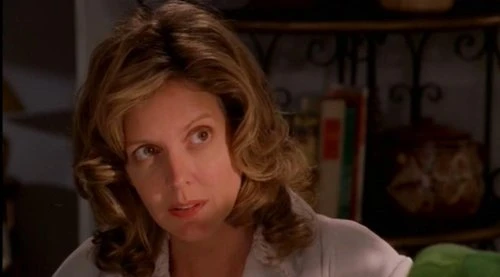
3.2, “Dead Man's Party,” is an important step in the ongoing story, hiding under a frivolous plot. Buffy's difficult reintegration to her life in Sunnydale (after a touchingly joyful reaction to her return from Giles) leads to her mother Joyce organising a get-together with her and her friends. Along the way, though, her friends turn it into a huge party, which only alienates Buffy more. That's before an African mask that Joyce has acquired for her collection summons the dead to act as its army. Zombies were about the only classic monster Buffy hadn't tried yet, and an all-out assault by the living dead on a party full of teens was surely irresistible. For the characters, the episode is awkward but eventually cathartic, as they face up to their anger and disappointment with each other. As Xander says, in one of the series' less subtle metaphors,“You can't just bury stuff, Buffy, it'll come right back to get you.”
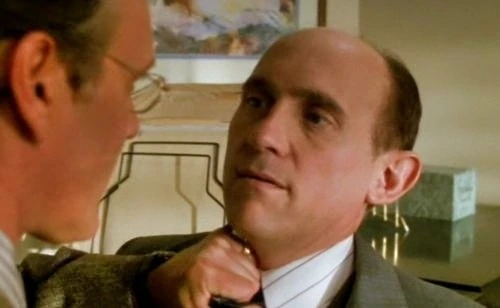
As much as I like Joyce, and as good as it is to see her and Buffy reconnect, so much of Buffy's estrangement is her fault. She did, after all, deal incredibly badly with Buffy's “coming out” as the Slayer, and outright kicked her out of her home. At least from this point on, Joyce is fully in the loop with the Slaying and the nightly nightmares in Sunnydale. In spite of excellent performances by Sarah Michelle Gellar and Kristine Sutherland, they're almost overshadowed by Nancy Lenehan (Grace Under Fire, My Name is Earl) as Joyce's passive aggressive mumsy friend Pat. The best part of the episode, though, is seeing Giles apply a little pressure to Principal Snyder (the wonderful Armin Shimerman) to convince him to let Buffy rejoin Sunnydale High. A punch-the-air moment, it's only the beginning of more of Giles's rougher Ripper side coming through this season.

It's episode three that really kicks the season into high gear, introducing one of the most important characters in the franchise. “Faith, Hope and Trick” in fact introduces three recurring characters, all named in the title, although the other two aren't as important. Fab Filippo (Level 9, Queer as Folk's US remake) is likeable as Buffy's new, short-term replacement boyfriend Scott Hope. K. Todd Freeman (A Series of Unfortunate Events) is magnetic as the wonderfully named Mr. Trick, a flamboyant vampire of colour who laments the overwhelming whiteness of Sunnydale (“Strictly of the Caucasian persuasion in the 'dale.”)
It's the brilliant and charismatic Eliza Dushku who steals the episode, and pretty much the season, as Faith Lehane. A third Slayer for the series, activated following the death of Kendra at the hands of Drusilla in the previous season, Faith escapes to Sunnydale following the horrific murder of her Watcher at the hands of vampire lord Kakistos. The ancient vampire, “so old his hands and feet are cloven,” comes straight to Sunnydale with his henchmen, including Mr. Trick, to kill Faith for her grievous wounding of him with a battle-axe. There's a solid subplot in which Giles feigns working on a spell to stop the apocalyptic demon from the previous finale returning but is actually trying to get Buffy to open up and move on from her devastating battle with Angel, leading up to the heroic vampire suddenly returning to Earth in the episode's final moments. However, it's for introducing Faith that this episode will be best remembered.
Faith immediately upsets the dynamic of the Scooby Gang, threatening to usurp Willow as Buffy's new best friend, effortlessly turning Xander's head and almost recentring the series on herself as a more confident, more aggressive Slayer. It's a tribute to the Dushku's performance that the balance between Faith's angry, in-your-face persona and the extreme vulnerability underneath is so well portrayed. While much of her backstory remains unexplored in the series, it's clear that she is from an abusive and deprived background, a stark contrast to the middle-class and ultimately supportive home that Buffy comes from. Faith's story is what Buffy's could have been without the backing of her friends and Watcher. Dushku, only seventeen when filming her appearance here and so the only one of the supposedly teenaged cast actually playing her age, gives Faith remarkable depth. Already one to watch due to her roles in films such as That Night, This Boy's Life and True Lies, Buffy was Dushku's big break, but only recently has her experiences of abuse as a young actress and the effect on her come to light. Watching her play Faith, a character who is obviously troubled and also highly sexualised, is both more affecting and more disturbing with that in mind.
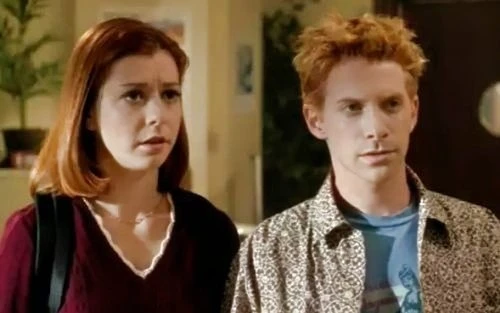
3.4, “Beauty and the Beasts,” sees the series approaching more adult concerns with its supernatural metaphors. An especially brutal attack on a student at night paints lycanthrope Oz as the prime suspect, but instead it's the work of one of his friends, the seemingly innocuous and laid back Pete (John Patrick White – Black Thunder, Bonechillers). Behind closed doors, Pete is a jealous, possessive, and abusive boyfriend to Debbie (Danielle Weeks – Campus Ladies, Unhappily Ever After). To make himself more of a man, Pete has concocted a formula that transforms him into a super strong monster, all the better for ripping apart any man he suspects of coming between him and Debbie. Of course, after a while he doesn't need the potion – a potent allegory for the many men who struggle to contain their anger. While Buffy had played with the Jekyll and Hyde concept before with Angel's transformation, “Beauty and the Beasts” is a more direct lift and just as effective. Seth Green puts in excellent work as Oz, and Weeks, normally a comedy actor, is also very affecting. Meanwhile, in the background, Buffy tries to care for a feral Angel, warped by his relative centuries of torment in Hell, linking the two plotlines further. Altogether, an excellent exploration and condemnation of toxic masculine behaviour.

3.5, “Homecoming,” is a fairly silly but effective episode which sees the Scott/Buffy relationship, such as it is, fizzle out just before the Homecoming dance. Buffy reverts to her LA-popular-girl roots when she goes up against Cordelia for the crown of Homecoming Queen. Meanwhile, Mr. Trick tries to rid himself of the twin threats of Buffy and Faith by organising Slayerfest '98, inviting humans, vampires (Jeremy Ratchford returning as Lyle Gorch from 2.12, “Bad Eggs”) and “spiny-headed looking things” to hunt the two Slayers down. A foul-up sees Buffy and Cordelia forced to resolve their differences as they become the hunted pair. Spending a lot of time on Buffy's more negative characteristics, it's a good reminder that she's still a teenager and that this is still a teen show. In the background, the long-simmering but often one-sided tension between Willow and Xander finally comes to a head when they kiss, setting in motion big heartache later on. One of the weaker episodes of the season, it's still an awful lot of fun and introduces the Big Bad for the season quietly at the end: Harry Groener as Mayor Richard Wilkins the Third.
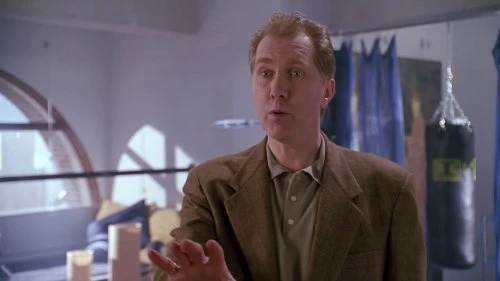
So often playing politicians and ministers, Groener has appeared in genre shows including Quantum Leap and multiple iterations of the Star Trek franchise, as well as jobbing along making one-off appearances in various series. His main career is on stage, and Buffy remains his biggest and best known TV role. He excels as the Mayor, outwardly mild-mannered and civic-minded, but secretly the most evil and despotic character in the series so far. Having built Sunnydale on top of the Hellmouth over a century earlier, specifically for demons to feed on as part of his many agreements with dark powers, the Mayor has extended his life through magics, posing as his own descendants to maintain his grip on power. Hilariously well-spoken – he hates cursing – the germ-phobic golfer is an endlessly entertaining bag of contradictions.

The next episode is an absolute classic. 3.6, “Band Candy,” sees the Mayor employing Trick as his new lieutenant, who in turn subcontracts to Ethan Rayne (the late Robin Sachs, returning from season two) to create a diversion while a necessary sacrifice is made to a very large demon that lives in the sewers beneath Sunnydale. Ethan creates cursed chocolate bars that Principle Snyder instructs the students to sell. The result is that all adults who eat the addictive candy – pretty much everyone in town – revert to their adolescence. The subsequent chaos is hilarious, with Giles, reverting to his dangerous Ripper persona, seducing Joyce before coming to his senses long enough to help defeat Ethan and the demon Lurconis. Funnier still is Armin Shimerman playing the teenaged dweeb version of Snyder, hopelessly tagging along after Buffy and co. An absolute joy to watch, “Band Candy” is one of the best episodes of the series.
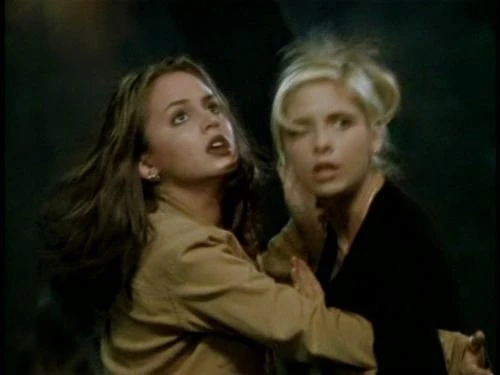
3.7, “Revelations,” isn't up the standards of the best of the season, but it's still a solid story in which Serena Scott Thomas (Diana: Her True Story, The World is not Enough) appears as Gwendolyn Post, Faith's new Watcher who turns out to be a wrong'un. Faith's already shaky ability to trust people is hit when not only does Post betray her but Buffy's secretive sheltering of the resurrected Angel is discovered. Her sheltering of a man who last year brutally murdered one of the gang's own and tormented all of them goes down about as well as you would expect. It's followed by “Lover's Walk,” the season's only appearance by James Marsters as the ever-popular Spike. Having been dumped by Drusilla for a Chaos demon (“Have you ever seen a Chaos demon?”), Spike kidnaps Willow and Xander in order to force the former to cast a love spell for him. It's a great episode, showing us for the first time the truly lovelorn and lost version of Spike who we'll see again, and also propelling the Willow-Xander storyline forward when they are caught in each other's arms when rescued. Ending with Cordelia suffering a horrific and distressingly realistic injury, it's a shocking turn of events that has repercussions through the series.
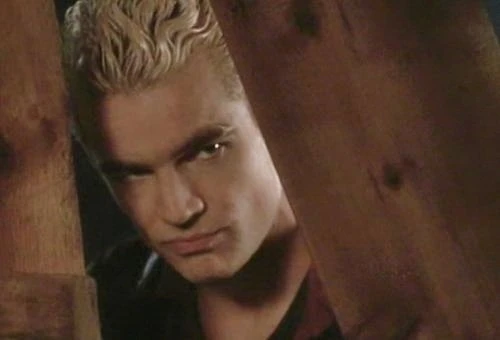
This leads directly into “The Wish,” one of the very best episodes of the series. Humiliated after finding Xander cheating on her, Cordelia tries to reintegrate with the popular clique. Now ruled by Harmony Kendall, played by Mercedes McNab (Addams Family Values, Hatchet) and who'd been appearing in the series on-and-off since the original pilot, the popular girls dismiss her as the geek's cast-off. Her standing at an all-time low, Cordelia is approached by Anya (Emma Caulfield – Beverley Hills 90210, Once Upon a Time, WandaVision). The new student turns out to be a vengeance demon, tricking Cordelia into wishing that Buffy, whom she blames for the humiliating downturn her life has taken, never came to Sunnydale. Reality instantly shifts into a nightmarish alternative timeline, referred to by characters and fans alike as “Bizarro-world” (a little Superman reference there). Barely any students remain alive, no one goes out after dark, and vampires prowl the streets. The Master (Mark Metcalf, returning from the first season) was never stopped by Buffy, and has risen to rule the town, feeding happily of the humans who are left. What's more, Xander and Willow are vampires, engaged in a sick, sadomasochistic relationship, and as the Master's new favourites, get to keep Angel as a tortured pet.
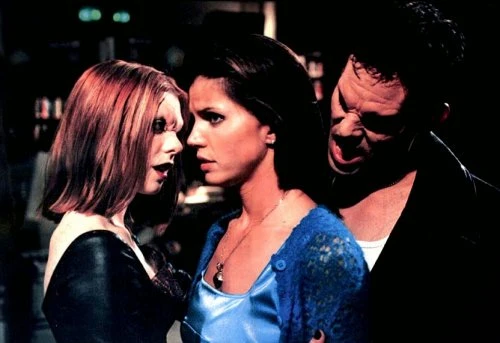
It's a tour-de-force episode, darker and with more twisted humour than we've seen before. In the alternative reality, Giles commands a group of students called the White Hats – this universe's version of the Scoobies. When Buffy finally arrives in Sunnydale, having been diverted by earlier battles, she is cold, scarred and cynical. Most horrifyingly, Buffy eventually loses to the Master, and it's only by luck that Giles is able to reverse the spell in time and put things back where they were. The episode gets a direct sequel later in the season with 3.16, “Doppelgangland.” Anya, now trapped in her adolescent human form and unable to order a beer in spite of being 1120 years old, attempts to recruit Willow to retrieve her magic amulet from before it was destroyed by alt-Giles, but the spell goes awry and brings Willow's vampire self from the other reality. Alyson Hannigan obviously had a ball playing the evil version of Willow, but what's fascinating is the little hints towards the “real” Willow's development. Glimpses of her sexuality and the darker side of her nature that will play across the coming seasons are rewarding to catch in retrospect.

Back to the chronological order, the next episode is 3.10, “Amends.” It's not the most exciting episode in itself, but it's hugely important for the ongoing storyline. Angel, having mostly recovered his wits but still suffering from the trauma he's suffered, begins experiencing visions of the people he has killed. Robia LaMorte returns for her final appearance as Jenny Calendar (on sufferance it turns out, having wished to no longer be involved with the series), tormenting Angel with the knowledge that he is too weak to resist giving into his evil nature. Trying to get him to give in, the vision goads him to kill Buffy, but instead Angel vows to kill himself by waiting for the sun to come up. It's a little overwrought, but the scenes between Buffy and Angel are pretty powerful, and when the sunrise is blocked by an unexpected festive snowstorm (did I mention this was the Christmas episode?) it's all rather sweet.
In the background, Oz and Willow make their own amends, but Cordelia remains estranged from the group, signposting that she's outgrown the Scoobies and will be moving on. Significantly, it's revealed that Jenny is in fact a representation of the First Evil, a primordial dark force that will be back in a big way in season seven. The First taking direct involvement in Angel's affairs shows how important he will be to the oncoming mythic adventures of his own series, and his miraculous reprieve shows that there are other powers looking out for him. It is still not entirely clear which side was responsible for bringing Angel back from Hell – the First claimed to have done so, but then, it's bound to be a big fibber. In either case, “Amends” lays the groundwork for the series Angel.
3.11, “Gingerbread,” is unusual in being written by a female duo, regular Buffy writer Jane Espenson and Lois & Clark and Roswell writer/producer Thania St. John in her only credit for the franchise. Joyce stumbles across the bodies of two children in the playpark, who appear to have occult symbols carved onto their hands. Believing this to be the work of witches, the gang investigates, but Joyce takes matters into her own hands, beginning with a vigil and building to a literal witch hunt. While there's some funny material as she and some of the other local mother’s form MOO - “Mothers Opposed to the Occult” - the entire sequence of events is chilling and all too believable. On one side, it's entirely understandable that Joyce finally reaches breaking point and decides something has to be done about the supernatural threat that plagues the town, but on the other, it rapidly becomes a frightening display of bigotry and victimisation.
Willow's increasingly deep delve into the magic arts is, of course, the focus, with her mother (Jordan Baker) making her one and only appearance in the series as she finally decides to take an interest in her daughter's life so that she can condemn her. Giles is targeted too, his library raided for a very familiar seizing of books, and Buffy is lumped in with the witches by association, but there's a clear undercurrent of misogyny and homophobia in here too. Witches are largely viewed as female, of course, and the episode climaxes with Willow, Buffy and Amy (Elizabeth Anne-Allen returning from magical episodes in the previous seasons) tied to stakes. Retrospectively, Willow's later homosexuality adds to this, but there's also Michael (Blake Sennet Swendson), victimised as much for his use of make-up and feminine style as his dabbling in magic. In the end, the two children are revealed to be two halves of a single demon manipulating the town, but it remains a strong exploration of discrimination and hysteria. Still, the episode is mainly remembered for Amy turning herself into a rat in order to escape, a condition she remains in for the next two years.
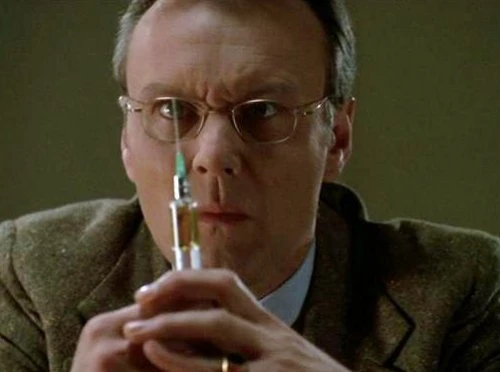
3.12, “Helpless,” is one of the most powerful and horrific episodes of the series so far. If a Slayer reaches her eighteenth birthday, by tradition the Watcher's Council puts her through a gruelling test to see if she is able to truly handle herself in the face of terrifying danger. Giles repeatedly hypnotises Buffy under the guise of spiritual training and goes on to drug her, leading to her losing her superhuman strength. The plan is to trap her with a particularly brutal vampire and to see if she can survive. In spite of being overseen by the head of the Council, one Quentin Travers (a perfect Harris Yulin – Ghostbusters II, Frasier, The X-Files) Giles is unable to fully go through with it and rebels, but the damage has been done. The vampire Kralik – a traumatised psychopath with mother issues even before he was transformed – breaks out and tracks down Joyce, abducting her to draw Buffy to his lair. Jeff Kober (Sons of Anarchy, The Walking Dead), who specialises in playing big, scary bastards is chilling as Kralik, and while Buffy defeats him using her wits, we've never seen her quite so threatened. What's worse though is her betrayal by Giles, dealing an almost fatal blow to their close relationship. Finally, just to rub salt in the wound, Travers fires Giles from the Council and moves to place a new Watcher in charge of Buffy and Faith.
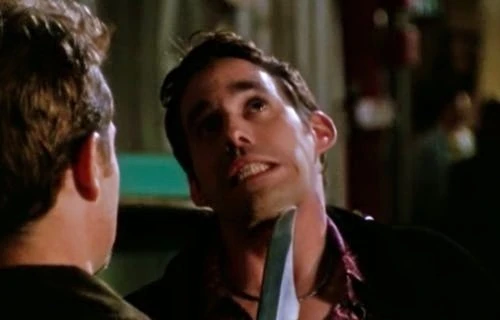
Next up is 3.13, “The Zeppo,” an absolute joy of an episode which focuses on Xander's exploits as the extra, non-essential part of the team. While Buffy, Angel, Faith, Willow and Giles – acting as unofficial Watcher – face down a sisterhood of demons who are intent on reopening the Hellmouth to usher in the end times, Xander is pushed out and told to stay safe. Still reeling from his breakup with Cordelia, who's ratcheted up the verbal abuse directed at him to beyond season one levels, and feeling distinctly like a useless add-on to the supernatural team, Xander struggles to find his place. While a full-fledged, apocalyptic Buffy adventure goes on in the background, Xander gets a car, picks up an awful shallow date, and almost gets stabbed by the ridiculously violent local bully, Jack O'Toole. When he doesn't welch to a passing cop, O'Toole – a sinister Channon Roe (My So-Called Life, Windfall) decides to make Xander part of his gang. Well, once he's raised the other members of the dead that is. Xander prevents O'Toole from destroying the school, puts the gang back in the ground and manages to lose his virginity to Faith. All in a good night's work.
Speaking of Faith, the unrestrained new Slayer has been battling the forces of darkness both alone and alongside Buffy throughout the season. Her growing friendship with Buffy alienates Willow and prompts Buffy to act a little more rebelliously. While Buffy and Joyce are welcoming, Faith gradually grows more jealous and resentful of her friend's more comfortable, loving life. After “The Zeppo,” the season knuckles down to a more serious, serialised story that focuses on Faith and Buffy's increasingly strained relationship, and the new Slayer's chaotic turn to the dark side. Only 3.18, “Earshot” (an excellent episode in which Buffy is cursed with telepathy, covered previously on the site in great depth by John Winterson Richards), 3.20, “The Prom” and the aforementioned “Dopplegangland” really stand apart in this long final stretch.
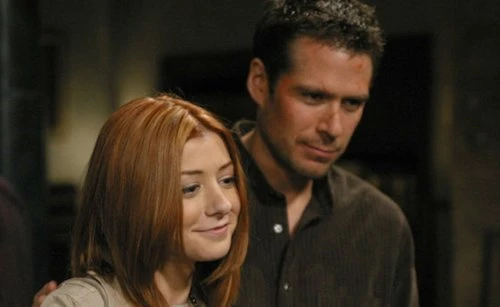
3.14, “Bad Girls,” sees the debut of Alexis Denisof as Wesley Wyndham-Pryce, Buffy and Faith's new Watcher. An American actor who seems to specialise in playing English characters, Denisof had previously been seen in Sharpe, Rogue Trader and First Knight before Wesley became his big role. Stuffy, pompous and pure public school, the young Watcher was armed with plenty of book-learning but very little practical experience. Unsurprisingly, neither Slayer is keen to follow his orders, still listening to Giles for unofficial guidance (his betrayal of Buffy having been forgiven perhaps too quickly). In spite of the immediate mutual attraction between Wesley and Cordelia, he does not gel well with the group at all. Hard to imagine at this stage that he'll go on to become one of the coolest characters in the franchise...
The attempts of this officious twit to control Buffy and Faith only drives them further away from authority. When the demon Balthazar and his army of vampire knights appear to try to thwart the Mayor's plans, the Slayers and their Watchers are pulled into the fight. Christian Clemenson (Boston Legal, CSI: Miami) is wonderfully unpleasant as the crippled, obese Batlhazar, but it's his final words that chill: “When he rises, you will wish I had killed you all.” Sure enough, behind closed doors the Mayor completes a ritual that renders him invulnerable for one hundred days, preparation for his mysterious Ascension.
Most shocking though is a simple mistake made in battle. Fighting off some vampires in the street, Faith accidentally stakes Allan Finch, the Deputy Mayor. Played by Jack Plotnick (The Mentalist), Allan never seemed to quite understand what he'd gotten himself into as the Mayor's aide, and was completely the wrong person to be observing the Slayers' fight. The inadvertent killing of a human being is a line crossed for both Buffy and Faith, with the former believing they should come forward and the latter in denial over her responsibility. Faith insists she doesn't care – he was a bad guy, after all – but it rings hollow. It's the decisive moment that leads to her spiralling out of control.
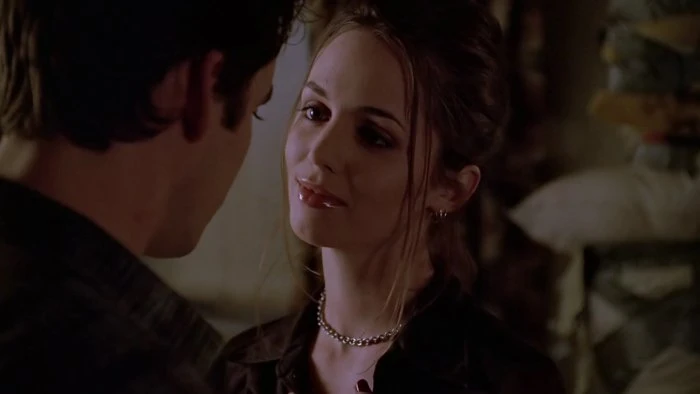
It's a moment where the series shifts into a darker and more mature focus. The following episode, “Consequences” is one of the least standalone so far, furthering the story of Faith's denial and her attempt to implicate Buffy in the killing. Naturally no one believes her, and both Xander and Angel try to help her in their own ways. Faith, in the moment that sees her go completely off the rails, essentially tries to rape and threatens to kill Xander, while Angel seems to be getting somewhere as the voice of someone who has experienced similar guilt. Unfortunately, Wesley has ordered a strike group from the Watcher's Council to arrest Faith, something which goes about as smoothly as could be expected and utterly shatters any chance Faith had of trusting the group again. In a final violent altercation, Buffy and Faith are attacked by Mr. Trick on orders from the Mayor. The vampire henchman does not make it out of the fight, and it gives the Slayers a mutual foe that helps them begin to rebuild their trust. At least, so it seems... the episode ends with Faith, in a shock move, offering to take Trick's place at the Mayor's side.
As with Giles, Faith is forgiven a bit too quickly by Buffy and the others, in spite of reservations, follow suit. However, Buffy isn't completely blind to the risks. 3.17, “Enemies,” just two episodes later, sees any slim chance of reconciliation lost, as the Mayor orders Faith to seduce Angel, figuring that she can bring him “happiness” and turn him back to his evil Angelus self. This naturally doesn't go anywhere – he only has eyes for one Slayer – but a back-up plan sees a semi-demonic mystic (career tall person Gary Bullock) remove Angel's soul by force. It's an intense episode that leads to Faith fully embracing her role as a villain, trussing Buffy up so that she and Angel can torture her... although it's all a ruse. Angel's been spectacularly faking it all along (although one imagines he genuinely enjoyed punching Xander out), and the mystic owed Giles a favour for introducing him to his wife. After this, Faith's alliance with the Mayor is out in the open, and there's no coming back.

3.19, “Choices,” propels the season towards its climax, as the Mayor and Faith prepare to receive the Box of Gavrok, an ancient demonic totem that will set the next stage for the Mayor's Ascension. A botched mission to steal the Box from City Hall leaves Willow as their hostage, leading to an incredibly tense prisoner exchange as the Scoobies reluctantly hand the Box back over to the Mayor in exchange for Willow's safe return. There's some exceptionally good acting from the main cast, with Seth Green in particular impressing as Oz finally loses it now Willow is in danger. Some comedy is provided when Snyder attempts to bust the handover, believing it the Box to contain drugs, rather than deadly demon insectoids, but even this isn't much respite from the serious stuff going on. Willow is safely returned, of course, and the Mayor eats his box of killer bugs, but at least the plucky witch got her hands on a few pages of the Books of Ascension.
3.20, “The Prom,” is a bit of a breather from the main plot as the Scoobies decide their pre-graduation ball will go on in spite of the impending horror. There's a subplot involving student Tucker Wells (Brad Kane) releasing hellhounds to destroy the prom, but it's predominantly about settling the main characters' status going ahead into the new season. Anya, still trapped in her life as a teenaged girl, unexpectedly asks Xander to the prom, something he takes a moment or two to process (“Men are evil. Will you go with me?”) Cordelia, following her father's prosecution for tax evasion, is broke and working in a dress store, leading to a lovely moment where Xander spends his savings on a prom dress for her. It's a sweet reconciliation between the characters, but equally leaves Cordelia's status on Buffy up in the air.
Willow and Oz are securely back together, but Angel, having been given food for thought by the Mayor's criticism of his unsustainable relationship with Buffy, decides that after the Ascension he'll be leaving Sunnydale. It's the best thing for both of them and will give Buffy a chance for a real future – plus, he's got a spin-off series to lead. Buffy does get a last dance with her love, though. In a rather touching moment, the increasingly unbelievable conceit of her secret life is broken, as Jonathan (Danny Strong) presents her with a gift on behalf of the school, and the title of Class Protector for her services in keeping them safe from the forces of darkness.
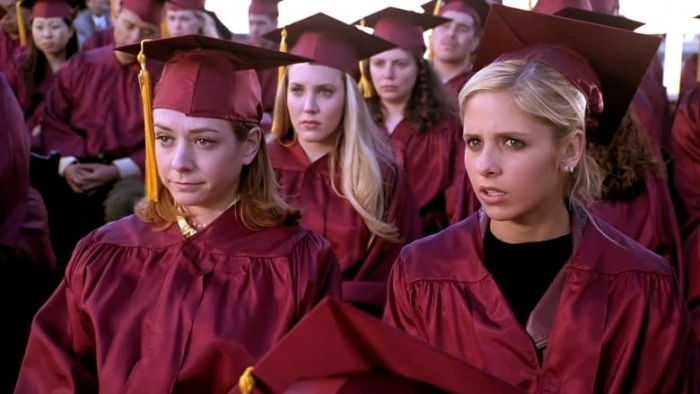
The season culminates in the climactic two-part “Graduation Day.” It's a busy story with a lot of ground to cover. Willow loses her virginity to Oz. Cordelia and Wesley attempt to kiss only to find themselves hilariously incompatible. Behind the scenes, Alyson Hannigan and Alexis Denisof were really hitting it off. Anya prepares to skip town, but not before imparting her knowledge as the only person in Sunnydale who's actually been to an Ascension. We finally learn what the Mayor's plan entails: he will transform into a pure demon, untainted by human blood (unlike the vampires and other lesser demons Buffy usually faces), and lay waste to Sunnydale as he takes it as his seat of power. To keep Buffy out of the fight, Faith shoots Angel with a poisoned arrow, which begins slowly, painfully killing him. The Council refuses to help a vampire, and only cure is the blood of a Slayer. Buffy quits the Council altogether, kicking Wesley off his position as her Watcher and negating his position on the series, and snaps. She goes after Faith, intending to feed her to her vampire lover.
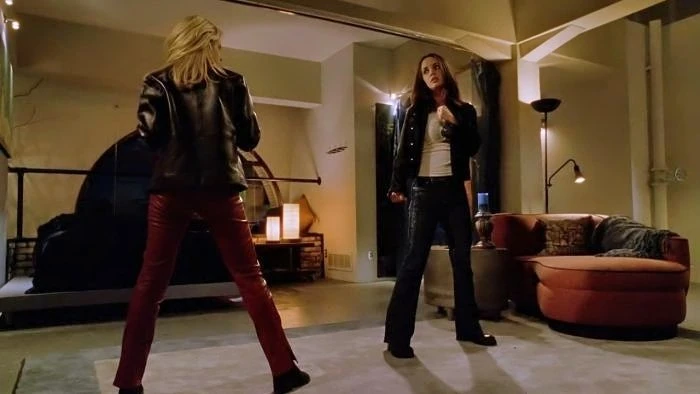
The fight between the two Slayers is powered by a season's worth of angst, jealousy, anger, betrayal and broken friendship. Faith is the character who is easily the most like Buffy, and her turn to darkness truly shows how fine a line Buffy is walking as she comes after her. Throughout the season, Faith has been an illustration of what Buffy could have become, without her mother, friends and caring Watcher to help guide her and keep her connected. “The Wish” cemented this, showing us a Buffy whose harder, lonelier life had left her not unlike Faith. The latter episodes, most notably “Graduation Day” itself, shows how Faith desperately needed a guiding hand, but tragically fell in with the worst possible mentor. Faith's relationship with the Mayor is a warped reflection of Buffy's pseudo-father/daughter relationship with Giles. Thanks to some strong writing and truly excellent performances by both Eliza Dushku and Harry Groener, it's clear that in their short time together Faith and the Mayor grew to truly care about each other. Buffy isn't able to capture Faith – instead offering herself up to a delirious Angel and barely surviving – but the fight leads her critically injured and in a coma. The following scene in the hospital, as the two Slayers lie sleeping in the same ward, is one of the most powerful of the series, with the Mayor's mask slipping completely to reveal cruel, incandescent rage.

Meanwhile, within their own dreams, Buffy and Faith are able to make some sort of amends, albeit temporarily. It's a scene laden with hidden meaning as Faith's cryptic words lay hints to developments in future seasons. More importantly, she reminds Buffy that the Mayor's human side is his weakness. The season climaxes with a truly epic battle, in which the students revolt, fighting the Mayor's hordes at the scene of their graduation. There are some surprising deaths, although the main cast get away mostly unscathed. The Mayor's transformation, midway through his Graduation Day speech, has not aged well thanks to some deeply shonky CGI, but it's still an exciting moment to see him in gigantic serpent form chasing Buffy through Sunnydale High as she taunts him about her wounding Faith. Thanks to some handy explosives, both the Mayor and the school are destroyed; a little anticlimactic but a definite full stop to the season.
Real-life concerns almost ruined the finale, though, at least in its home country. The horrific Columbine High School massacre occurred on April 29, 2000, only four weeks before the original airing of part one. With much criticism and condemnation of violence in entertainment and the media, the second half, with its scenes of students wielding weapons and explosives, was held back for almost two months. Similarly, “Earshot,” with its powerful and relevant exploration of school violence, wasn't shown in the States until September, another two months after the finale.
The end of the third season is a turning point for the series. High school is over, and the characters will be moving on to a new, more adult chapter of their lives. Buffy never again matched the consistency of quality that the classic high school years provided, but as a series that had the grace to grow older with its audience, it was a wise move. Staying out and pretending time wasn't passing would have been a cheat. The cast would be able to take their characters in new directions in the fourth season of Buffy, and the first season of its spin-off, Angel.
Published on February 20th, 2022. Written by Daniel Tessier for Television Heaven.



